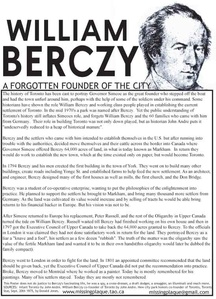WILLIAM BERCZY
 Missing Plaque Project Poster - William Berczy. TORONTO's FORGOTTEN FOUNDER
Missing Plaque Project Poster - William Berczy. TORONTO's FORGOTTEN FOUNDER
The history of Toronto has been cast to portray Governor Simcoe as the great founder who stepped off the boat and had the town unfurl around him, perhaps with the help of some of the soldiers under his command. Some historians have shown the role William Berczy and working class people played in establishing Toronto. In the mid 1970's a park was named after Berczy. Yet the public understanding of Toronto's history still inflates Simcoe's role, and forgets William Berczy and the 60 families who came with him from Germany. Their role in building Toronto was not only down played, but as historian John Andre puts it "undeservedly reduced to a heap of historical manure".
Berczy and the settlers who came with him intended to establish themselves in the U.S. but after running into trouble with the authorities, decided move themselves and their cattle across the border into Canada where Governor Simcoe offered Berczy 64,000 acres of land, in what is today known as Markham. In return they would do work to establish the new town, which at the time existed only on paper, but would become Toronto.
In 1794 Berczy and his men erected the first building in the town of York. They went on to build many other buildings, create roads including Yonge Street. and established farms to help feed the new settlement. As an architect, and engineer, Berczy designed many of the first houses as well as mills, the first church, and the Don Bridge.
Berczy was a student of co-operative enterprise, wanting to put the philosophies of the enlightenment into practice. He planned to support the settlers he brought to Markham, and bring many thousand more settlers from Germany. As the land was cultivated its value would increase and by selling of tracts he would be able bring returns to his financial backer in Europe. But his vision was not to be.
After Simcoe returned to Europe his replacement, Peter Russell, and the rest of the Oligarchy in Upper Canada turned the tide on William Berczy. Russell waited till Berczy had finished working on his own house and then in 1797 got the Executive Council of Upper Canada to take back the 64,000 acres granted to Berczy. To the officials in London it was claimed they had not done satisfactory work in return for the land. They portrayed Berczy as a liar a "knave and a fool", his settlers as a few dozen "rubbish". The truth of the matter was the oligarchy saw the value of the fertile Markham land and wanted it to be in their own hands (this oligarchy would later be dubbed the family compact).
Berczy went to London in order to fight for the land. In 1801 an appointed committee recommended that the land should be given back, yet the Executive Council of Upper Canada did not put the recommendation into practice. Broke, Berczy moved to Montréal where he worked as a painter. Today he is mostly remembered for his paintings. Many of his settlers stayed. Today they are mostly not remembered.
SOURCES
This wiki page is based upon the text of William Berczy Missing Plaque Project Poster. It states that the poster itself does not do justice to Berczy's fascinating life: he was a spy, a cross-dresser, a draft dodger, a smuggler, an illuminati and much more.
- Infant Toronto by John Andre.
- William Berczy co-founder of Toronto by John Andre.
- New city park honors co-founder of Toronto, Toronto Star, Sept. 20th 1975, by Donald Jones


